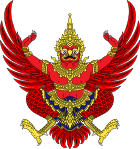This article needs additional citations for verification. (December 2013) |
 |
|---|
|
|
|
|
The politics of Thailand are conducted within the framework of a constitutional monarchy, whereby the prime minister is the head of government and a hereditary monarch is head of state. The judiciary is independent of the executive and the legislative branches.
Following the coup d'état of 22 May 2014 revoking the 2007 constitution, a military organization called National Council for Peace and Order (NCPO) had taken over administration. The chief of NCPO abolished the national assembly and assumed the responsibilities of the legislative branch. Under the martial law enforced throughout the kingdom, military courts have been tasked to be responsible for some cases that are normally under the civilian courts. However, the court system, including the Constitutional Court, still remains in existence, even without the constitution. The NCPO was formally dissolved following the swearing-in of the new cabinet on 16 July 2019.[1]
The Kingdom of Siam (now known as Thailand) was ruled as an absolute monarchy. After the Siamese revolution in 1932, led by westernized bureaucrats and a tradition-oriented military, Siam officially became a constitutional monarchy with a prime minister as the head of government. The first written constitution was issued. Politics became the arena of fighting factions between old and new elites, bureaucrats, and generals. Coups occurred from time to time, often bringing the country under the rule of military juntas.[2] To date, Thailand has had 20[3] charters and constitutions, reflecting a high degree of political instability. After successful coups, military regimes have abrogated existing constitutions and promulgated interim charters. Negotiations between politicians, bureaucrats, influence peddlers, corporate leaders and army officers have become a driving force in the restoration of temporary political stability.
The Economist Intelligence Unit rated Thailand a "flawed democracy" in 2023.[4]
- ^ Nanuam, Wassana; Bangprapa, Mongkol (17 July 2019). "HM gives cabinet moral support". Bangkok Post. Retrieved 9 January 2019.
- ^ Kongkirati, Prajak (2024). "Thailand: Contestation, Polarization, and Democratic Regression". Cambridge University Press. doi:10.1017/9781108565677. ISBN 978-1-108-56567-7.
- ^ Paddock, Richard C.; Lindner, Emmett (2020-10-24). "Bangkok Is Engulfed by Protests. What's Driving Them?". The New York Times. ISSN 0362-4331. Retrieved 2020-11-21.
- ^ Democracy Index 2023: Age of Conflict (PDF). Economist Intelligence Unit (Report). 2024. Archived (PDF) from the original on 2024-06-09. Retrieved 2024-07-22.
